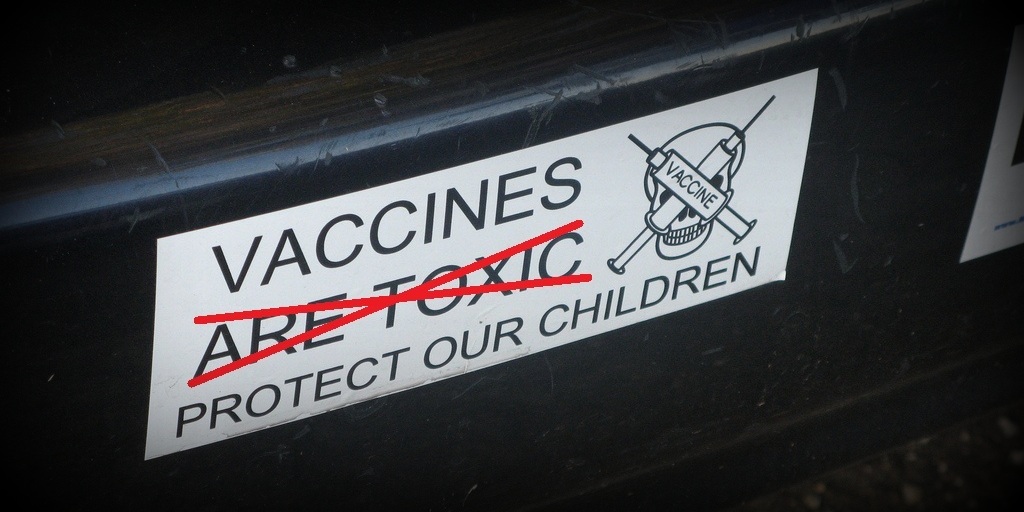We’re facing two nightmare scenarios for the future of the COVID-19 global pandemic.
The first is that no successful vaccine is ever developed, and therefore virtually all of us have to take our chances with the virus.
The second is that a vaccine is successfully developed, one that works and safely confers long-term immunity to SARS-CoV-2. But a substantial proportion of people refuse to take it because they have been influenced by the anti-vaccination movement, allowing the virus to keep spreading indefinitely.
This second scenario is looking ever more likely. A new analysis just published in Nature journal tracks what the paper’s abstract describes as “the recent explosive growth in anti-vaccination views” on the social media platform Facebook.
Drawing on exhaustive quantitative data from last year, the authors draw a chilling conclusion: in the battle for hearts and minds, the anti-vaxxers are winning, and their views will become dominant online in just a decade from now.
What the new paper shows
The authors, led by Neil Johnson from the Institute of Data, Democracy and Politics at George Washington University in Washington, DC, looked at the networks involving nearly 100 million individuals who expressed views regarding vaccination on Facebook.
“There is a new world war online surrounding trust in health expertise and science, particularly with misinformation about COVID-19, but also distrust in big pharmaceuticals and governments,” Johnson says. “Nobody knew what the field of battle looked like, though, so we set to find out.”
In previous work, Johnson has led teams studying the online proliferation of hate speech and the development of support networks for the Islamic terrorist group ISIS.
In this study, Johnson and his co-authors detail clusters of fans following Facebook pages with pro- and anti-vaccine content, such as the 40,000 members of the page “RAGE Against the Vaccines” versus the 1 million fans of “The Gates Foundation” page.
In terms of total numbers of engaged individuals, pro-vaccine pages still outrank the antis — by 6.9 million to 4.2 million — with the “undecideds” making up a much larger component totalling 74.1 million.
However, the anti-vaxxers have more than double the numbers of clusters — 317 in total, compared to 124 for the pro-vaccine advocates. That means that the anti-vaxxers are more dispersed, and therefore in a much better position to win over new converts from the much larger undecided population.
And this is indeed what seems to be happening.
How the anti-vaxxers win
The map of the overall network shows a worrying phenomenon. While anti-vaxxers have ideologically fringe positions, they have become expert at attaching themselves to undecided clusters.
Meanwhile, the pro-vaccination clusters “are confined to the smallest two of the three network patches” — meaning they “may remain ignorant of the main conflict and have the wrong impression that they are winning,” the analysis finds.
In other words, the pro-vaccine people have gotten stuck in the echo chamber so dreaded by pro-science communicators. They basically talk to each other, while the anti-vaxxers go out and seek new recruits.
“We thought we would see major public health entities and state-run health departments at the center of this online battle, but we found the opposite. They were fighting off to one side, in the wrong place,” Johnson warns.
The anti-vaxxers have another big advantage. While those supporting and defending vaccines have to stick to the science and support their views with genuine evidence, vaccine deniers can pretty much make up anything they want.

And they do. As the authors describe, anti-vaccination activist clusters “offer a wide range of potentially attractive narratives that blend topics such as safety concerns, conspiracy theories and alternative health and medicine, and also now the cause and cure of COVID-19.”
As the Alliance for Science has previously reported here, the new COVID-related conspiracy theories seeded by anti-vaxxers might appeal to anyone skeptical about 5G communications networks, GMOs or Bill Gates.
Even worse, the authors include modeling that shows the anti-vaxxer groups overtaking the pro-vaccine supporters within a decade from now. That is, unless the pro-science contingent can come up with a more effective organizing and messaging strategy.
How to fight back
The analysis clearly shows that pro-vaccine individuals and institutions need to up their game, particularly given the deluge of misinformation that has accompanied the COVID-19 pandemic.The data in the new Nature paper comes from before the pandemic, between February and October 2019, and it is likely that things have only gotten worse since then.
For example, what is currently the second-most popular petition on the White House website — having gained over half a million signatures — raises a number of medical conspiracy theories, including falsely accusing the Gates Foundation of “intentionally sterilizing Kenyan children” with a tetanus vaccine.
According to Johnson: “Instead of playing whack-a-mole with a global network of communities that consume and produce (mis)information, public health agencies, social media platforms and governments can use a map like ours and an entirely new set of strategies to identify where the largest theaters of online activity are and engage and neutralize those communities peddling in misinformation so harmful to the public.”
How can we do this? Clearly, pro-science messaging must be diverse, humorous, compelling — and factually accurate. People who are not already engaged must be convinced to share it with friends and family, as individuals in a peer group will always be more persuasive than institutions.
There is no time to lose. The groundwork for a supportive public conversation and political environment must be laid at the same time as scientists in the lab are battling to come up with a successful vaccine.
The stakes could not be higher. If the anti-vaxxers win, so does the virus — and millions could die as a result.
Feature image source: Sheridan-Raed Mansour
